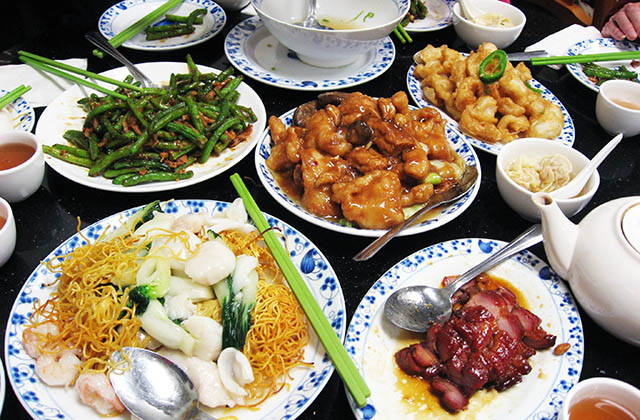The Evolution of Chinese Food as a 'Cultural Ambassador'

A meal at a Chinese restaurant in Daly City, California. (Joanne Wan/Flickr)
When chef Martin Yan moved from China to the United States more than three decades ago, there were only around 3,000 to 4,000 Chinese restaurants in the country. Today, that number has grown more than ten-fold. This, he believes, is one indicator of the increasing closeness between the two countries. “Food brings all of us together,” Yan said. “I think food is the best bridge, the best ambassador.”
Yan, host of the popular cooking show Yan Can Cook, was speaking in a panel discussion entitled “Chinese Food as a Cultural Ambassador” at Asia Society’s National Chinese Language Conference in Chicago. He noted that “to understand the culture [of a country], you start with food.”
Filmmaker Ian Cheney agreed, saying that when we use food as a window to the outside world, we start to appreciate not only where the food came from, but the people who brought it here. For his documentary, The Search for General Tso, he traced the origins of the popular Americanized Chinese dish General Tso’s chicken, and how it tells a story of Chinese immigration and adaption to the United States. “Food is, for many people around the world, their first window into a place they may not have traveled to,” he said. “And it's kind of a weird window, because food adapts, or we adapt it, as it travels around the world.”
He said that from the height of anti-Chinese sentiment in the United States in the late 19th century, through the various waves of Chinese immigration during the mid-to-late 20th century, Chinese immigrants often used food as a way into American communities — both financially and socially. “Everybody eats,” Cheney said. “It's a way of sharing a table with people.”
Chinese immigrants had to adapt their native cuisine to better suit American tastes, leading to what purists would label inauthentic dishes. But, Cheney said, these hybrids opened doors. “As Chinese restaurants began popping up all over the country, people began to associate Chinese culture and Chinese food with these positive family memories,” he said. “And I think that shifted, a little bit, the cultural exchange and cultural attitudes in America.”
Yan noted that increased travel and immigration is now leading to an explosion in the authenticity and diversity of Chinese cuisine in America — and vice-versa. “In the old days when I first came over, you only saw chop suey, chow mein, sweet and sour pork, or egg rolls,” he said. “Nowadays you have Shanghai cuisine, Shanghai dumplings, Hakka cuisine, Hunan, Shaanxi, and Sichuan cuisine, etc.” This, he added, is indicative of growing American appreciation for the enormous ethnic, cultural, and linguistic diversity within China.
But with the ongoing fusion and adaptation of culinary traditions from abroad, the very definition of what is “American food” and “Chinese food” is constantly evolving. Cookbook author and host of Sauced in Translation Howie Southworth said that even after two decades of traveling around China, he is constantly encountering dishes that he’s never seen or imagined.
“I think the grand mistake is to say that there is something called ‘Chinese food’ that just stopped — like an encyclopedia that has a last page,” he said. “It's constantly moving — one could argue much more rapidly than American cuisine. Chinese food is so dynamic and changeable that it would surprise the average American diner.”
Watch the complete discussion in the below video.
Martin Yan, Howie Southworth, Ian Cheney, and Monica Eng discuss "Chinese Food as a Cultural Ambassador" at the 2016 National Chinese Language Conference in Chicago. (55 min., 33 sec.)

